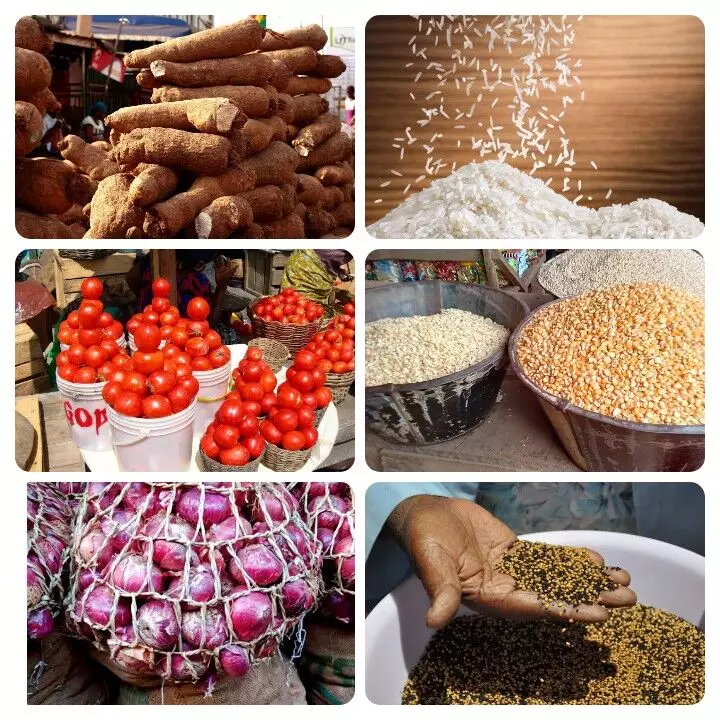- Home
- /
- Trending-News
- /
- Increasing prices of...
Increasing prices of food items worry residents of Ibadan and environs

The now regular rise in prices of food items is giving cause for several residents of Ibadan and its environs to express worries, the newsmen report.
Following checks at various markets, prices of basic food items such as rice, beans, yam, and vegetables, among others, have steadily increased astronomically.
This situation has led several of the residents to be struggling to adjust to the situation, consequently expressing worries about what was in stock for them during the upcoming Yuletide.
NAN findings revealed that the price of a bag of local rice currently goes for between N85,000 and N90,000, while foreign rice goes for between N100,000 and N110,000.
Also, prices of vegetable and palm oil are currently high and beyond reach in several markets in Ibadan metropolis and its environs.
A rice merchant at Bodija market, Alhaja Titilope Olawale, said the prices were however determined by what was available at their source of purchase.
“This determines what we will sell,” she said.
Olawale said a bag of imported rice was N76,000 early in October, while 25 litres of Kings vegetable oil go for N85,000 as against N70,000 about a month ago.
The Babaloja of Bodija International Market, Alhaji Sunmaila Jimoh, who also deals in rice, pointed out that a bag of local rice was N75,000 earlier in the year.
“Farmers in the North, where we get our supply from, are saying that flood swept off most of their rice farmlands.
“They said this made their supply go down drastically, making them increase the prices of those items they currently have in the store.
"Even if something could have been redeemed from the flood-ravaged farmland after the flood, prices of rice will continue to be on the high side with the little harvest,” he said.
In the markets, a beans’ measurement bowl that contains 10 pieces of measurement tin-milk sells for N3,500.
This has forced most people to run away from buying it, as they now go for whatever is cheap.
A beancake seller, Mrs. Beatrice Jolaade, said also that sales have dropped drastically as a small piece of beancake is now N100.
Jolaade said Nigerians are now striving hard to make ends meet to feed their families since when petrol’s pump price started going up.
A school teacher, Mr Joseph Eze, said a crate of eggs which used to be a cheap source of protein has increased from N3,500 to between N5,600 and N6,000 depending on sizes.
According to a poultry farmer, Mr Benjamin Abatan, the hike in prices of egg is due to prices of maize which is however gradually coming down.
Abatan said: “Formerly, a tonne of maize was N900,000 before it skyrocketed to N1 million, but it currently goes for between N750,000 and N800,000.
“But the hike in the price of eggs was caused by the high cost of transportation, due to the increase in prices of petrol, which affected other items.
“This is yet to come down.”
Another consumer, Mrs. Bimbola Adekunle, said an average family used to rely on eggs to make ends meet. “But this currently seems unaffordable for many families.”
Adekunle said many housewives now prefer to fry pepper to eat yam and sweet potato, instead of frying eggs.
Supreme News reports that a keg of 25 litres of palm oil now sells for N52,000, as against the N25,000 it was going for before.
A bottle is selling for N1,700 as against N800 it was sold for during its season.
A palm oil merchant, Mrs. Taiwo Adeniyi at Omi-Adio Market, said the hike in price could be because this was not the season for palm oil, making it costly.
“During its season, it will be cheap and will sell for between N18,000 and N25,000 for a keg of 25 litres.
“The palm oil we are selling now is the one people stored to sell during its off-season period, which will last till February when new palm fruits will be tapped for extraction of new palm oil,” she explained.
As for vegetable oil, Adeniyi said a 25-litre gallon of Kings oil is N75,000 compared to N65,000 it was being sold before.
Also, a bottle of vegetable oil is being sold for N2,400 against N1,800.
A civil servant, Mr. Timothy Akinlabi, remarked that the prices of foodstuffs are now going beyond the reach of ordinary Nigerians.
“This hike in the prices of foods is being compounded by the low purchasing power of the masses,” he said.
Akinlabi advised the Federal Government to work on the value of the country’s currency, saying N1,000 is now like N100 in value.
“The civil servant’s earnings are now meagre compared to what he spends it on, after foodstuffs and transport,” he added.
A housewife, Mrs. Funmilola Adebayo, explained that the way she would be wandering through the market before she could buy little things for her family needs is worrisome.
“This is because we now use plenty of money to purchase a few things.”
She then offered some prayers for a better Nigeria that would enable its citizens to feed themselves and eat what they desire to eat.




